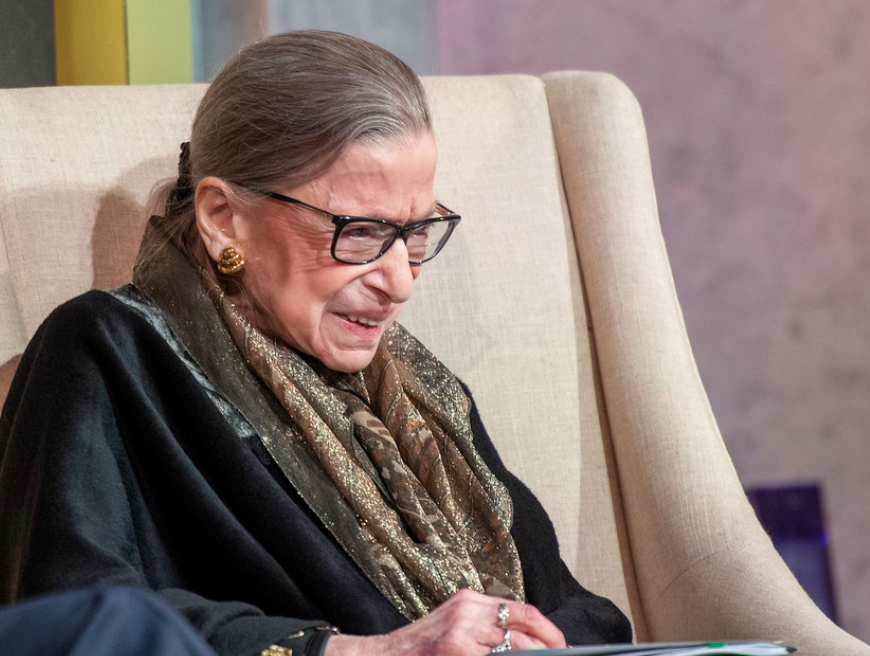|
By H. Prado Ruth Bader Ginsberg, known popularly as RBG, sadly passed away last week, leaving behind a legacy of fights against discrimination and paving the way for a more equal society. Throughout her career, she inspired many with her achievements and courage to rule according to what she believed in. She became an idol to many generations and a large part of what men and women are able to do today is possible due to her arguments in the Supreme Court.
Early life and career Born in March 1993, Ginsberg excelled from a young age as she was a very devoted and vocal student. Following her full-scholarship graduation from Cornell University, she went on to study Law at Harvard, where she was the first woman in the Harvard Law Review’s Editorial staff and one of the 8 women in a class of 500 students. Then, despite graduating from one of the US’ finest colleges, RBG had difficulty in being hired by a law firm as a she was a woman and a mother. Later, when she was employed by the Rutgers School of Law as an assistant professor, the Dean asked her to receive a low salary because her husband already had a job with good compensation. Consequently, she resulted to wearing oversized clothes when she was pregnant with her second child as she was afraid that it would hamper her contract. In the 70s Ginsberg became involved in issues regarding gender inequality due to her experiences. This led to her partnership with the American Civil Liberties Union, in which she published two law review articles and then proceeded to found the Women’s Rights Project Council. She also became the first tenured professor at Columbia Law School and later served as a Court of Appeals Judge in Washington D.C. Cases as a litigator Ginsberg is known for her defenses as a litigator before the Supreme Court: She won 5 of the 6 cases she argued, guaranteeing the right for women to study in the same state university as men and preventing companies from not employing women based on their contraceptive methods. Famously, she worked on the Reed v. Reed case in which Idaho State prioritised men in receiving estates from those who died without a will. RBG won the case and when reflecting about it said that this was the first time the “Court ruled in favor of a women who complained that her State had denied her the equal protection of its laws.” Not only that, Ginsberg also fought for male equality such the Weinberger v. Weisenfield case, which she argued against the fact widows could collect benefits from Social Security, but widowers couldn’t as men were assumed to be the main providers for the family. Supreme court In 1993, Ginsberg was nominated to serve on the Supreme Court by President Clinton. She was the second woman to serve and was known for her notorious attitude and for speaking her beliefs even against majority votes, while always fighting for equality. She worked to educate the Court and is known for replacing ‘I respectfully dissent’ with ‘I dissent’ when disagreeing with what she deemed to be discriminatory, and even had special collars she wore when disagreeing with majority’s opinions. She used to say that Judge’s robes were tailored for men as they could still display their ties, and so it was fitting for women to be able to show collars expressing their views. Furthermore, after fellow Judge Sandra Day O’Connor retired, Ruth Ginsberg was the sole female judge in the Supreme court, creating what she described as “not a good image for the public to see’ and encouraging more women to pursue judgeship. Late life In 2018, Ms. Ruth was diagnosed with pancreatic cancer which she had already battled in 2009 in addition to her fight with colon cancer. In plus, there was public pressure for her to retire due to her thin appearance, but Ruth persevered, reminding the public that Judge Oliver Holmes only retired at 90 and she planned to continue serving for as long as she felt capable. Unfortunately, on September 18th she passed away due to complications while fighting metastatic pancreatic cancer. Her memorial was held on Wednesday the 23rd and will continue on Thursday as US citizens come from throughout the country to honour RBG, who will always be remembered as a ‘pioneer for gender equality’. Bibliography https://www.britannica.com/biography/Ruth-Bader-Ginsburg https://www.nytimes.com/2020/09/18/us/ruth-bader-ginsburg-dead.html?auth=login-google https://www.newyorker.com/news/postscript/ruth-bader-ginsburg-supreme-court-the-great-equalizer-obituary
0 Comments
Your comment will be posted after it is approved.
Leave a Reply. |

